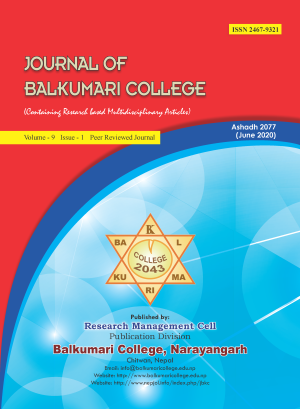In-vitro antioxidant, antidiabetic and toxic effect of Ageratum houstonianum from Chitwan district Nepal
DOI:
https://doi.org/10.3126/jbkc.v9i1.30067Keywords:
Phytotoxic, antioxidant, α- amylase, hyperglycemic, Ageratum houstonianumAbstract
Medicinal plants are safe and the oldest natural products used for many years to conserve food, to treat health disorders and to prevent diseases. The active chemical compounds formed during secondary vegetal metabolism is usually responsible for the biological properties of some plant species used throughout the world for various purposes including treatment of diabetes, cancer, infectious diseases etc. The present study was undertaken to analyze the phytochemicals by colour differentiation method, to evaluate the toxic effect by phytotoxic assay, antidiabetic activity by α amylase enzyme inhibition and antioxidant potential by DPPH (2,2-diphenyl-1-picrylhydrazyl) scavenging activity of methanolic extract of Ageratum houstonianum. Treatment of problem in carbohydrate uptake needed the inhibition of α-amylase plays a role in the digestion of polysaccharide and glycogen, is made a strategy for controlling diabetes. For this study whole plant was collected, dried and the powder was made. The extraction was carried out by cold percolation in which methanol was used as a solvent. The methanolic extract was subjected to In-vitro phytotoxic activity by adopting the standard protocol. The α-amylase enzyme inhibition activity of plant extract was carried out by using starch as substrate, pancreatic α amylase as the enzyme, and acarbose as standard. The result of in-vitro phytotoxic bioassay revealed that the plant extract showed moderate activity with percentage growth regulation 80 and 25 percent in a concentration-dependent manner. The α-amylase enzyme inhibition was 74.13 to 99.39 percent in a dose-dependent manner. The antioxidant potential of Ageratum houstonianum extract showed mild activity with IC50 123.67 μg/ml as compared to the standard ascorbic acid IC50 5.38 μg/ ml. It is concluded from the present study that Ageratum houstonianum could be used as a natural source to isolate antioxidant, anti-hyperglycemic agent, herbicide and weedicide as it shows a good α amylase inhibition, radical scavenging and phytotoxic activity respectively.




